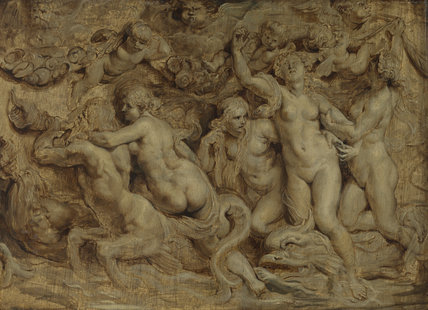
Dr Donal Cooper , Dr Alexander Marr and Dr Laura Slater
Research into the medieval and renaissance (1100-1700) world at Cambridge is focused on Britain, Europe and the Eastern Mediterranean littoral. We work broadly in terms of chronology, geography and medium, taking an interdisciplinary outlook that includes the history of science, modern and medieval languages, intellectual history, the history of political thought, and digital humanities. We collaborate with colleagues across the University, such as the Fitzwilliam Museum, the Hamilton Kerr Institute and the History, Modern and Medieval Languages, and English Faculties. Externally, we collaborate with national museums (including the National Gallery, the National Portrait Gallery, and the V&A) and with universities in Germany, Italy, Greece and Croatia.
Our specialists take a transnational perspective on the complex visual cultures of the period. Beyond his focus on Italy, Dr Cooper researches artistic patronage in Dalmatia, Crete and other former territories of the Venetian Stato da Mar. Dr Marr’s research has focused principally on Italy (especially the Duchies of Urbino and Milan), the Southern Netherlands (chiefly Antwerp), France, Germany and England. Dr Slater is particularly interested in medieval responses to antiquity in the Holy Land as part of her investigation of the crusades.
Dr Cooper’s research addresses art and architecture in Italy c.1200-1600, especially the significant relationships between artworks and their spatial and material settings. A particular focus is the Italian church interior as the period’s richest arena for artistic patronage and display, adopting an inter-medial approach that integrates painting, sculpture, architecture and the so-called decorative arts, as well as contemporary liturgical and devotional practice. Past projects have reassessed artworks by Giotto, Sassetta, and Raphael in light of their spatial and ritual contexts. A series of publications has explored the art of the Franciscan order of friars at Assisi and elsewhere. He is now extending his interest in setting and meaning via digital techniques of mapping and 3D visualization.
Dr Marr works on art and intellectual culture c. 1450 to c. 1700. He is particularly interested in the relationship between language and images. Past work has explored mathematics and material culture, the history of concepts, and the history of books and reading (especially in relation to architecture and engineering). More recently, he has investigated epistemic images, the longue durée histories of “ingenuity” and “genius” (including their word histories), Tudor art (especially portrait miniatures), and the early modern imagination. At present, he is working on Albrecht Dürer, Peter Paul Rubens, and Hans Holbein the Younger—all in relation to the notion of “wit”.
Dr Slater investigates the relationships between art, ideas, power and politics in medieval Britain and Europe, c. 1050-1400. This includes work on the cultural consequences of medieval violence, particularly the crusades. She has written on monumental recreations of the holy places of Jerusalem in Europe and their place in devotional culture and dynastic memories. She has a continuing interest in female cultural patronage in the Middle Ages, especially in the fourteenth century. She is currently investigating interactions between sight and sound in late medieval art in relation to Queen Philippa of Hainault.
Dr Slater and Dr Cooper convene the Cambridge Medieval Art Seminars, which since 1995 have hosted a wide range of international speakers and provided a lively forum for discussion and debate on the medieval world.
Associated Research Staff:
- Dr Anya Burgon (Research Fellow, Trinity Hall, from Michaelmas 2020)
- Dr Christina Faraday (Research Fellow, Gonville & Caius College, from Michaelmas 2020)
- Dr Jessica Maratsos (Keith Sykes Research Fellow, Pembroke College)
